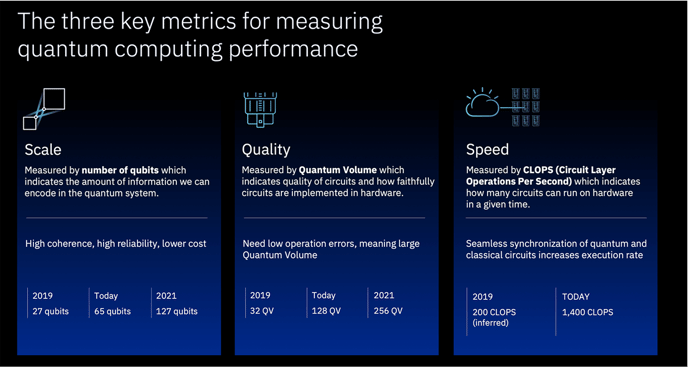Quantum Processor Measurements
So, imagine, you are in the market for a Quantum Processing Unit (QPU), which one should you buy?
One way to compare QPUs is to consider looking at scale (measured by the number of qubits), quality (measured in Quantum Volume), and speed (measured in CLOPS).
A quantum computer's performance can be compared to a classical computer by measuring the number of qubits it has and the number of classical bits it can simulate. A quantum computer with 50 qubits can simulate 10,000 classical bits.
Quantum computers are able to perform certain calculations much faster than classical computers. However, the quantum computer's performance is not only determined by the number of qubits it has, but also by the quality of those qubits. In order to compare quantum computer performance, you must take into account both the number of qubits and their quality.
Quantum volume is a metric that helps compare the performance of different quantum computers. It is calculated by multiplying the number of qubits by the square of the quantum volume. This metric can be used to compare different types of quantum computers, as well as different arrangements of qubits.
The CLOPS algorithm can be used to compare the performance of different quantum computers. This algorithm is designed to measure the number of quantum gates that can be executed in a certain amount of time (how many circuits can be executed per second). The higher the CLOPS score, the faster the quantum computer. CLOPS is an acronym for “Circuit Layer Operations per Second.”
References:
- Driving quantum performance: more qubits, higher Quantum Volume, and now a proper measure of speed
https://research.ibm.com/blog/circuit-layer-operations-per-second - Quantum Volume
https://en.wikipedia.org/wiki/Quantum_volume - Qubit
https://en.wikipedia.org/wiki/Qubit

